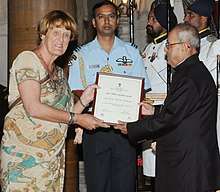Ilse Kohler-Rollefson
Ilse Köhler-Rollefson (born ) is a German scientist known for championing pastoralism, Ethnoveterinary medicine and camels with special reference to India. She found the Raika people whose way of life was under threat because of their dependence on camels and she decided to help. In 2017 she was awarded the highest award for women in India, the Nari Shakti Puraskar and, in 2018, the Federal Cross of Merit of the German Federal Government.
Ilse Köhler-Rollefson
hler-Rollefson | |
|---|---|
 and a camel | |
| Born | Köhler Hamburg |
| Nationality | Germany |
| Occupation | vet |
| Known for | championing camels and pastoralism |
| Spouse(s) | Gary Rollefson |
| Children | Aisha Rollefson, Jon Rollefson |
| Website | ilse-koehler-rollefson.com |
Life
She came to notice when she went to India on a fellowship of the American Institute of Indian Studies in 1990/91 to study camel socio-economics and management patterns.[1] There she engaged with the Raika people whose lives are traditionally built around camels. However because the Raika can no longer make a living from breeding camels, the camels are disappearing and the traditional camel culture is being lost.[2]

The Raika (aka Rabari) people are an ethnic group who believed that they were created in order to care for camels by Shiva.[3] In 1992 she published "Raika Dromedary Breeders of Rajasthan: A Pastoral System in Crisis".[4] They are pastoralists mainly in India.
She was trained as a veterinarian and an anthropologist and these come together in Ethnoveterinary medicine. She has found that traditional practices of veterinary medicine are legitimate and seeks to validate them.[5] She has noted that at least since colonial times scientists had noted indigenous expertise in animal health and their diagnostic skills before implementing their Western-technology projects.[5]
She noted and researched the role of the Raika and other pastoralists as creators of indigenous livestock breeds and guardians of domestic animal diversity ('Keepers of Genes') and was a moving force behind the concept of Livestock Keepers' Rights. Later she promoted Biocultural or Community Protocols for pastoralists as a tool for obtaining their rights under the UN Convention on Biological Diversity.
She created the NGO "Lokhit Pashu-Palak Sansthan" which lobbied the government of India for help, together with Hanwant Singh Rathore. She is the co-founder and key worker with the League for Pastoral Peoples.[2]. In order to create income for the Raika she set up the social enterprise Camel Charisma which markets camel milk and other camel products.
In 2002 she received an Associate Rolex Award for Enterprise. In 2017 President Pranab Mukherjee presented her with the highest award for women in India, the Nari Shakti Puruskar. The function took place at the Presidential palace, Rashtrapati Bhavan, in New Delhi,
Works include
- A Field Manual of Camel Diseases: traditional and modern health care for the dromedary (co-author in 2001)[6]
- Camel Karma: Twenty Years Among India's Camel Nomads (2014)[1]
References
- Köhler-Rollefson, Ilse (2014). Camel Karma: Twenty Years Among India's Camel Nomads. Tranquebar Press. ISBN 978-93-84030-63-6.
- "Our lady of the camels - Rolex Awards". rolex.org. Retrieved 2020-04-07.
- Street, Brian V. (November 2002). Literacy and Development: Ethnographic Perspectives. Routledge. pp. 28–29. ISBN 978-1-134-56620-4.
- Köhler-Rollefson, Ilse (1992). "The Raika Dromedary Breeders of Rajasthan: A Pastoral System in Crisis" (PDF). Nomadic Peoples. 30: 74–83.
- Ilse Kohler-Rollefson|Köhler-Rollefson, I., Bräunig, J. 1998. Anthropological Veterinary : The Need for Indigenizing the Curriculum Paper presented at the 9th AITVM Conference in Harare 14–18 September 1998
- A field manual of camel diseases : traditional and modern health care for the dromedary. Mundy, Paul., Mathias, Evelyn., Köhler-Rollefson, Ilse. London: ITDG. 2001. ISBN 978-1-85339-503-1. OCLC 42875459.CS1 maint: others (link)